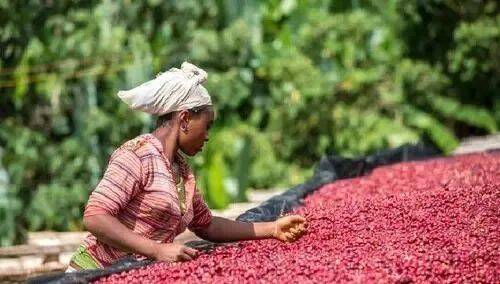The Ethiopian government hopes to solve the recent chaos in the coffee industry
Recently, according to local reports in Ethiopia, the Ethiopian Ministry of Agriculture and the Coffee and Tea Authority are concerned about coffee farmers' default in providing credit to exporters and suppliers, so government officials hold meetings with farmers. and hope to solve the problem as soon as possible.
In recent months, Ethiopian exporters and suppliers have bought coffee beans on credit from growers, but have not received payment after the growers have delivered the beans, and the arrears now amount to billions of bills. As a result, farmers complained so much that there were reports that they committed suicide because they had lost hope of getting their money back, and radical farmers joined forces to rob exporters of unpaid receivables.

Coffee makers blame the problem on the "vertical integration" scheme, which was legally introduced five years ago but was fully implemented only two years ago. The plan aims to replace the previous model of coffee farmers trading coffee on the Ethiopian Commodity Exchange (ECX). In previous ECX transactions, payment was made as soon as the goods were received, while under the "vertical integration" scheme, suppliers and exporters took the coffee directly from the farmer on credit without clear legal guidelines for payment.
However, on March 8, 2024, government officials held a discussion meeting with coffee growers and suppliers, hoping to address the financial difficulties denounced by farmers. But the authorities believe that vertical integration is of great benefit to farmers. "people are now confused and claim that vertical integration is destroying the coffee market and that the interests of the public and coffee growers are harmed after vertical integration is introduced," the minister of agriculture said at the meeting. This is a false statement, there may be few defaulters, and those who criticize vertical integration must produce evidence. " Moreover, the director of the Coffee and Tea Administration also believes that there are only a small number of defaulters, and they have blacklisted defaulters and revoked their qualifications, so that they can no longer buy and export coffee.

Therefore, the government believes that the benefits of vertical integration outweigh the disadvantages, and Ethiopia's past coffee export performance has played a large role in the transition from EXC to vertical integration, with coffee export earnings exceeding US $1 billion. In addition, in this model, coffee growers, suppliers and cooperatives can export coffee directly without having to go through the ECX exchange, which is very beneficial to farmers and can be highly encouraged by international prices.
But now farmers and producers say they will sell coffee on credit because exporters stop lending at the bank, have no money, and because of the 14% credit growth ceiling introduced by the national bank, the coffee market is now controlled by a small number of wealthy exporters, and farmers have no choice but to sell coffee at exporter prices. So I hope the government can regulate the market. after all, 90% of the coffee last year was exported through vertical integration programs.
Important Notice :
前街咖啡 FrontStreet Coffee has moved to new addredd:
FrontStreet Coffee Address: 315,Donghua East Road,GuangZhou
Tel:020 38364473
- Prev

Tanzania Coffee beans | introduction to Kilimanjaro Coffee beans
In the African region, there are many well-known coffee producing countries, such as Ethiopia, Kenya, Rwanda and Tanzania. Among them, Tanzania is one of the three coffee giants in Africa, and it is also known as the "coffee gentleman" in Europe. Tanzania Coffee Tanzania is located in eastern Africa, south of the equator
- Next

Drink powder to complain about Starbucks, shop assistant: wronged!
▲ Click to follow | Daily boutique Coffee Culture Magazine Coffee Workshop this year's Starbucks is very different from the past. Consumers are overwhelmed with the new speed of products. Some time ago, before punching in the limited drinks of the cherry blossom series, the recommended signboard of the store has been changed to salt Ruibai. This change makes you like fresh.
Related
- What grade does Jamaica Blue Mountain No. 1 coffee belong to and how to drink it better? What is the highest grade of Blue Mountain coffee for coffee aristocrats?
- What are the flavor characteristics of the world-famous coffee Blue Mountain No. 1 Golden Mantelin? What are the characteristics of deep-roasted bitter coffee?
- Can I make coffee a second time in an Italian hand-brewed mocha pot? Why can't coffee be brewed several times like tea leaves?
- Hand-brewed coffee flows with a knife and a tornado. How to brew it? What is the proportion of grinding water and water temperature divided into?
- What is the difference between Indonesian Sumatra Mantinin coffee and gold Mantinin? How to distinguish between real and fake golden Mantelin coffee?
- What does bypass mean in coffee? Why can hand-brewed coffee and water make it better?
- Unexpected! Ruixing Telunsu lattes use a smoothie machine to foam milk?!
- % Arabia's first store in Henan opens into the village?! Netizen: Thought it was P's
- Does an authentic standard mocha coffee recipe use chocolate sauce or powder? Mocha Latte/Dirty Coffee/Salty Mocha Coffee Recipe Share!
- What is the difference between Vietnam egg coffee and Norway egg coffee? Hand-brewed single product coffee filter paper filter cloth filter flat solution!

